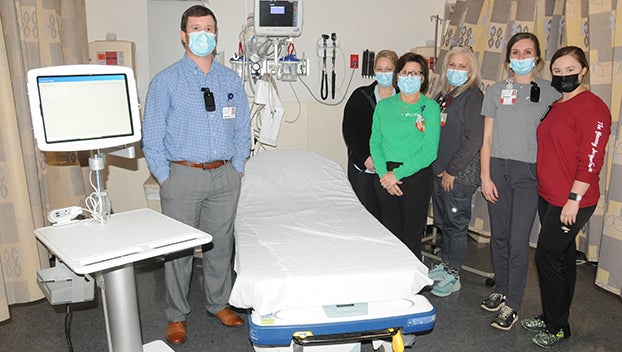ACH now offering UAB tele-stroke coverage
Published 5:13 pm Monday, December 13, 2021

- Shown from L to R: Atmore Community Hospital's Brad Lowery, Holly Gipson, Suzanne McGill, Tracey Jay, Kaylee Blackmon and Lauren Cook. | Andrew Garner/Atmore Advance
|
Getting your Trinity Audio player ready...
|
The first step in bringing healthcare specialists to Atmore has been taken.
Atmore Community Hospital (ACH) officials announced Dec. 13 that the hospital has entered into an agreement with University of Alabama-Birmingham (UAB) Medicine to provide the hospital with UAB eMedicine Tele-Stroke coverage.
According to a release, the coverage will allow for any patient presenting to ACH’s emergency department (ED) with stroke symptoms to have as part of their care team, and within 10 minutes of arrival, a neurological specialist physician from UAB Hospital via telemedicine.
“It’s huge for the community, especially as we expand,” ACH Administrator Brad Lowery said. “We were able to successfully test the UAB eMedicine Tele-Stroke system on Dec. 13. We went live immediately in our hospital ER following our successful test.”
According to officials, the specialist will be working directly with ACH ER physicians to determine the best care needed for each patient.
“The benefits to our patients and our community are many, most notably having this specialty care on site 24/7,” Dr. Shane Harigel, who is ACH’s ED medical director, said. “This service also allows patients to be diagnosed more quickly and provides for a more appropriate placement of the patient.”
Escambia County Health Care Authority CEO Jeff Booth said the key in the new system is that during a call where an ambulance is bringing in a patient with stroke symptoms, the ED nurse taking the call can push a button calling the neurologist. He added that the specialist will be able to be online prior to the patient’s arrival.
Once the patient arrives, the neurologist will be able to see the patient through the iPad’s camera, and after a series of tests, will determine whether or not the patient needs to be transferred, Booth said.
Booth added that the neurological assessment is important because then the doctor will be able to construct a critical care plan for the patient.
Lowery said at present, ACH is seeing between 75-100 stroke patients per year.
About a month ago, ACH signed the three-year contract with UAB.
Booth said the contract is broad and it allows the hospital add addendums for other services.
“We’re starting with stroke because it’s one of the areas members of the community can best benefit,” he said, adding that critical care and cardiology are also on the list of services ACH is looking to add.
Booth said this is not about ACH, it’s about rural healthcare and finding a way to bring specialists to the community when you can’t have them here 24/7.
Lowery said the new tele-service isn’t about transferring patients from here, it’s about having them stay when appropriate.
According to hospital officials, a large number of patients presenting with stroke symptoms end up not needing to be transferred to another hospital. Having the specialist consult available to patients and ED phsyicians will allow for a much better decision-making proces regarding the need to transfer the patient or treat them locally.
“As a result, more of our patients (our fellow citizens) will be able to stay at home for their care following their ED visit,” Booth said in a release. “We are excited about Atmore now having these services provided locally and look forward to sharing success stories with you going forward.”



